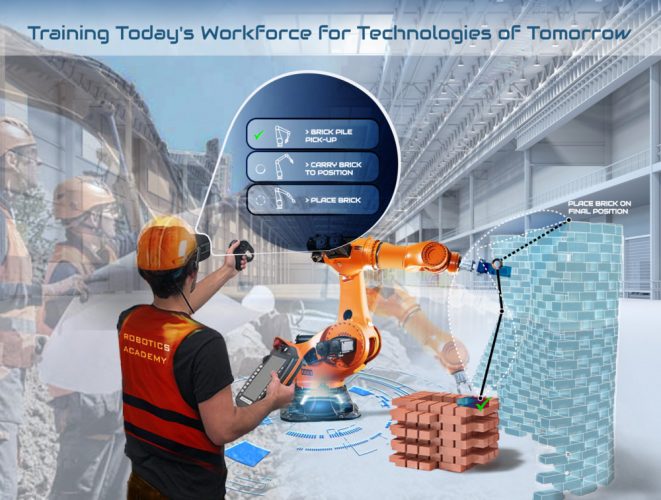The National Science Foundation’s (NSF) Convergence Accelerator Program has awarded a $1 million grant to a team of FIU researchers led by Professor Shahin Vassigh from College of Communication, Architecture + The Arts (CARTA), for a research project called Preparing the Future Workforce of Architecture, Engineering, and Construction (AEC) for Automation and Robotic Processes. The project proposes a cloud-based training program for a Robotic Academy, which is composed of an immersive training software, a collaborative knowledge repository, and an automation forum.
During this nine-month project, the team will work closely with local companies and global industry experts to: 1) assess the impacts of adopting automation and robotic technologies in the AEC industry, 2) evaluate their automation training needs, and 3) develop an appropriate training program.
Today we are at the brink of the fourth industrial revolution due to advancements in the fields of Artificial Intelligence (AI), information technologies, and robotic automation. The global economy is rapidly being reshaped by the use of sophisticated machines that enhance human dexterity, visual perception, speed, and strength. These new technologies are bringing rapid change to the building industry, transforming jobs in design, manufacturing, and professional services at a speed and scale never experienced before. Preparing the workforce for an economy, which is increasingly defined by these technologies is critical.
According to Prof. Vassigh, “The grant provides an opportunity to integrate advances in AI, Virtual Reality (VR) and Augmented Reality (AR) technologies to create a state-of-the-art training program for a large segment of employees in the AEC industries.” The research and outcomes of this project will not only increase employment opportunities, but will also improve regional industry competitiveness.
Dr. Shu-Ching Chen, a Professor at FIU School of Computing and Information Sciences and one the project’s Co-Principal Investigators, will lead the AI and Machine Learning components of the project. According to Prof. Chen, “using object detection and pattern recognition will enable us to improve training programs in virtual environments. It will also allow us to customize the lessons based on the user’s interaction and evaluate the trainee’s performance.”
The first phase, which must be completed in the upcoming nine months, is focused on researching and planning the training program. If selected for a continuation grant of $5 million, the team will deliver the Robotics Academy and implement its adoption by the AEC industries.
The project will be conducted by CARTA faculty in collaboration with researchers from the College of Engineering and Computing, College of Arts, Sciences & Education, STEM Transformation Institute, Institute of Water and Environment, Jorge M. Pérez Metropolitan Center, and several local and national industry partners.
The Project’s industry collaborators include KUKA Robotics, Magic Leap, Gensler, ArquitectonicaGEO, SKANSKA, Oppenheim Architecture + Design, DSS Condo, McKenzie Construction, Gurri Matute, Berenblum Busch Architecture, UrbanCentric Analytics, Kruysman/Proto, and Atonaton.



